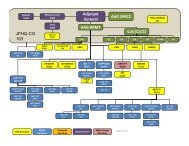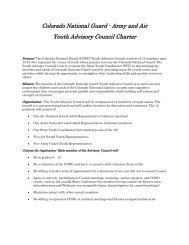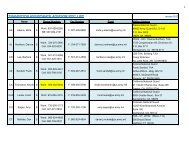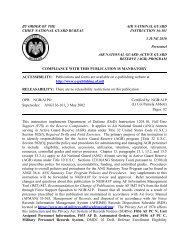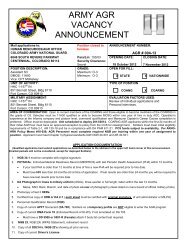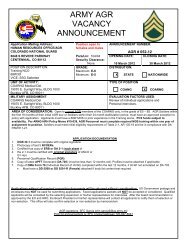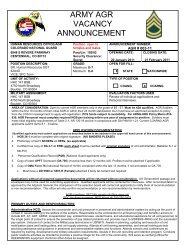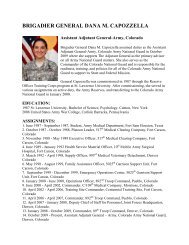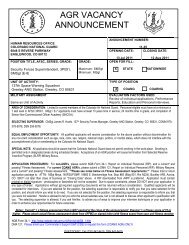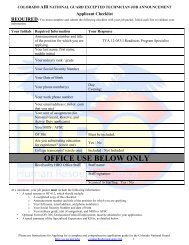Prosecuting Alcohol-Facilitated Sexual Assault - National District ...
Prosecuting Alcohol-Facilitated Sexual Assault - National District ...
Prosecuting Alcohol-Facilitated Sexual Assault - National District ...
Create successful ePaper yourself
Turn your PDF publications into a flip-book with our unique Google optimized e-Paper software.
E NDNOTES<br />
67 and 53a-71; Florida: Fla. Stat. 794.011; Kansas: K.R.S. § 510.040; Maine: 17-A M.R.S. 255-<br />
A; Maryland: Md. Criminal Law Code Ann. §§ 3-301 and 3-304; Michigan: MCLS § 750.520a;<br />
Minnesota: Minn. Stat. §§ 609.341 and 609.342; Mississippi: Miss. Code §§ 97-3-95 and 97-3-<br />
97; Montana: M.C.A. §§ 45-2-101 and 45-5-502; Nebraska: R.R.S. Neb. § 28-319; New<br />
Hampshire: R.S.A. 632-A:2; New Jersey: NJ Stat. 2C:14-2; New Mexico: NM Stat. § 30-9-10;<br />
Nevada: N.R.S. 200.366; New York: NY CLS Penal § 130.35; North Carolina: N.C. Gen. Stat.<br />
14-27.5; Oklahoma: 21 Okl. St. 1111; Oregon: ORS 163.427; Pennsylvania: 18 Pa.C.S. § 3121;<br />
Rhode Island: R.I. Gen. Laws §§ 11-37-1 and 11-37-2; Tennessee: Tenn. Code 39-13-501 and<br />
503; Texas: Tex. Penal Code § 22.011; Utah: Utah Code Ann. §§ 76-5-402 and 66-5-406;<br />
Washington: ARCW § 9A.44.060; West Virginia: W. VA. Code §§ 61-8B-1 and 61-8B-4; and<br />
Wyoming: Wyo. Stat. § 6-2-302.<br />
36 See, e.g., R.R.S. Neb. § 28-319 and Wis. Stat. § 940.225.<br />
37 For a discussion of sexual assault when the victim has been surreptitiously intoxicated, see THE<br />
PROSECUTION OF ROHYPNOL AND GHB RELATED ASSAULTS, supra note 9.<br />
38 This chart is based upon Kentucky law. “A person is guilty of rape in the first degree when [h]e<br />
engages in sexual intercourse with another person who is incapable of consent because he is<br />
physically helpless.” K.R.S. § 510.040. “Physically helpless means that a person is unconscious<br />
or for any other reason is physically unable to communicate unwillingness to an act. Physically<br />
helpless also includes a person who has been rendered unconscious or for any other reason is<br />
physically unable to communicate an unwillingness to an act as a result of the influence of a<br />
controlled substance or legend drug.” K.R.S. § 510.040.<br />
39 MICHAEL RAND & CALLIE MARIE RENNISON, U.S. DEP’T OFJUSTICE, BUREAU OF JUSTICE<br />
STATISTICS, How Much Violence Against Women Is There? VIOLENCE AGAINST WOMEN AND<br />
FAMILY VIOLENCE: DEVELOPMENTS IN RESEARCH, PRACTICE AND POLICY 8 (NCJ 199701) (Bonnie<br />
S. Fisher ed., 2004), available at http://www.ncjrs.gov/pdffiles1/nij/199702.pdf.<br />
40 Abbey et al., supra note 2.<br />
41 Antonia Abbey et al., <strong>Sexual</strong> <strong>Assault</strong> and <strong>Alcohol</strong> Consumption: What Do We Need to Know<br />
About Their Relationship and What Kinds of Research Are Still Needed?, 9 AGGRESSION &<br />
VIOLENCE BEHAVIOR 271-303 (2004).<br />
42 Abbey et al., supra note 2, at 44.<br />
43 “[H]eavy drinkers may routinely use alcohol as an excuse for engaging in socially unacceptable<br />
behavior, including sexual assault.” Abbey et al., supra note 2, at 46.<br />
44 Trial techniques for dealing with this issue are discussed in Step 3: Trial.<br />
45 See Step 3: Trial – Other Bad Acts.<br />
46 To prove that a defendant is guilty of rape or sexual assault, a prosecutor does not need to<br />
corroborate a victim’s testimony. For example, 18 PA. C.S.A. § 3106 (2006) provides:<br />
The credibility of a complainant of an offense under this chapter shall be determined by the<br />
same standard as is the credibility of a complainant of any other crime. The testimony of a<br />
complainant need not be corroborated in prosecutions under this chapter. No instructions shall<br />
be given cautioning the jury to view the complainant’s testimony in any other way than that in<br />
which all complainants’ testimony is viewed.<br />
This section parallels § 213.6(5) of the Model Penal Code.<br />
47 “A witness may not testify to a matter unless evidence is introduced sufficient to support a finding<br />
that the witness has personal knowledge of the matter. Evidence to prove personal knowledge<br />
may, but need not, consist of the witness’ own testimony.” FED. R. EVID. 602 (Lack of<br />
Personal Knowledge, in pertinent part).<br />
48 For example, the prosecution can use circumstantial evidence, which is evidence other than<br />
direct eyewitness testimony. “Circumstantial evidence also may be testimonial, but even if the<br />
circumstances depicted are accepted as true, additional reasoning is required to reach the desired<br />
NDAA<br />
45




